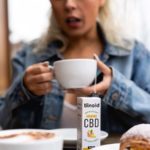Ready to dip your toe into CBD wellness? Here’s what to look for to ensure your CBD product is safe and effective.
There’s no denying that the popularity of CBD products has created unprecedented demand over the past few years. With the fast-moving growth of the industry, it can be a challenging task for consumers to determine which CBD company they should trust.
Whether you’re interested in trying CBD for pain relief, better sleep, or a sense of balance and well-being, the sheer amount of CBD choices can be overwhelming. It can be even harder to choose a product when you don’t know which products are of high quality and safe to use.
Here are 5 of the most important things you should look for before purchasing a CBD product:
1. Does the CBD Come From Hemp Grown in the USA?
Cannabidiol, or CBD, is one of the primary chemical compounds found in hemp. When considering a CBD product, it’s essential to look for CBD sourced from hemp grown within the US. Hemp grown abroad is largely unregulated, and it is unknown if harmful pesticides or chemicals were used in the growing or extraction process. In contrast, hemp growers in the US are required to comply with state and federal regulations during the cultivation and growing process. Supervised growing ensures a safer and cleaner end-product that is free of pesticides and other toxins that may end up in CBD if it is not farmed responsibly.
Look for companies that clearly state that their CBD is grown in the US, like veteran hemp authority, HempLand USA, who cultivate their sun-grown hemp using organic farming practices in the US. Companies like HempLand USA often have longstanding relationships with their growers, and some may even own their farms. An entirely US-based operation ensures greater quality control and a safer product for the consumer.
2. What Type of Extraction Method was Used?
Extraction refers to the process in which the CBD is isolated and removed from the raw hemp plant. There are different methods to extract CBD, and each method has a different impact on the final product, and ultimately on your health. Proper extraction of CBD maintains nearly all of the desirable health-supporting components from the plant.
Some of the extraction methods include solvent extraction using alcohol, steam distillation, decarboxylation (using heat and olive oil), and pressurized CO2 extraction. There are pros and cons to each extraction method. However, the current consensus maintains CO2 extraction as the most beneficial. CO2 extraction preserves the purity and potency of the hemp oil resulting in a higher quality product with minimal risk of residual solvents or contaminants.
Innovators in the hemp industry have perfected their CBD extraction using a superior method called Supercritical CO2 extraction. Though it may be vastly more expensive for a company to employ this method, there are a few such as HempLand USA that have invested in this cutting-edge method. Supercritical CO2 extraction produces a cleaner, non-toxic end-product that maintains the integrity of the oil.
3. Is the Label Accurate and Complete?
A study conducted in 2019 from the independent testing agency Ellipse Analytics tested the top-selling CBD products for contaminants and “truth in labeling.” The results were startling. They found that over half of the 240 samples tested were incorrectly labeled. The mislabeled samples contained far lower levels of CBD than listed on the packaging, and in some cases, no CBD at all. On the other side of the spectrum, the study found that some products had up to 6 times the amount of CBD that the label had claimed.
While there are some dishonest players, the good news is that there are honest companies that substantiate their product labeling by providing an independent analysis of their CBD product. The results of the third-party analyses are referred to as “lab reports” or COAs (Certificate of Analysis). It is vital that all CBD companies have their product’s lab reports readily available for consumers to view so that the report can be compared with the product label.
The CBD product itself should be clearly labeled with the type of CBD product it is (ex. Full-Spectrum, Broad Spectrum, or CBD Isolate), and how many milligrams of CBD are present. It should also contain a clearly defined ingredient list, instructions for usage, and an FDA disclaimer statement.
4. Check the Ingredients
It’s an unfortunate truth that some consumers are intentionally misled into thinking that CBD exists in a product when it does not. The label may read “hemp seed oil” or “hemp seed extract” and marketed as if it were CBD. When in reality, these extracts do not contain any of the active ingredient.
Hemp seed oil is a culinary oil resembling olive oil and contains no CBD. Make sure the ingredient label clearly defines the product as CBD. In some cases, CBD can be referred to as “full-spectrum hemp oil,” which does contain the active compound.
5. Was the CBD Independently Tested?
A CBD product that has been tested by a third party is especially important in determining its safety profile. The independent lab should test for pathogens, pesticides, heavy metals, and the cannabinoid count, which measures how much CBD and THC are present in the product. Additional tests can be done that outline the terpene profile or if there are any residual solvents in the product, such as ethanol or other alcohols commonly used in extraction methods.
The lab tests should be readily available on the company’s website and easy to find. HempLand USA provides a QR code on the product packaging that directs you straight to the lab report online. If a company obscures or tries to make it difficult to find the lab report, then run the other way. Remember: quality products have nothing to hide.
Knowledge is Power
This criterion should help guide you in making an informed decision on the trustworthiness of a CBD product and company. Always do your research. It’s important to choose a properly labeled CBD product from an honest and transparent company that offers lab-verified products. HempLand USA, who have been in the industry for over 5 years, exceeds all of the standards outlined above. For more information, visit hemplandusa.com.
Read More from Us: Click Here maryjanespost



